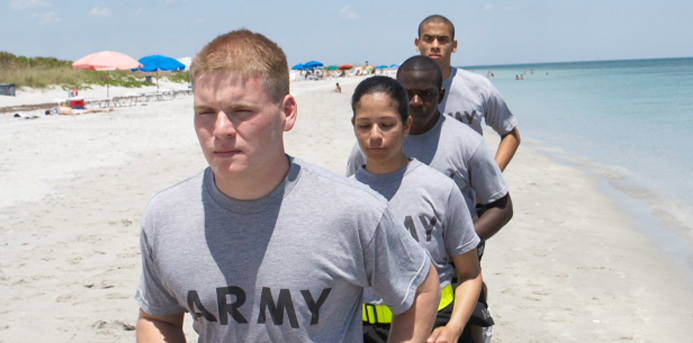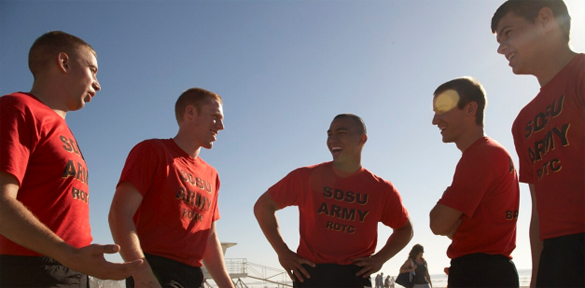More and more, students are considering Reserve Officer Training Corps (ROTC) as part of their college experience.
ROTC prepares students to become officers in the U.S. Military while getting their degree at one of more than 1,000 colleges and universities. Students who enroll in ROTC commit to serving in the military after completing their college education, which is, upon the award of the national scholarship, fully paid for by the ROTC program—a serious perk for students who are weighing their options.
Lake Bluff Students Choose ROTC
Incoming University of Illinois freshman Charles Gallagher and incoming University of South Carolina freshman Kurt Blumeyer, both of Lake Bluff, decided to enroll in ROTC during their senior years of high school. Gallagher plans to train to become a Marine during his time at U of I, while Blumeyer plans to train for the Navy during his four years at USC.
Coincidentally, the two attended Lake Bluff Middle School together and grew up in Lake Bluff; however, they were both motivated to join the program for different reasons.
“I’m very blessed to live in the country that I live in, and I felt like it’s my duty to give something back,” Blumeyer says. “It’s also been a dream of mine to see the world, so the adventure aspect of the Navy really appealed to me too.”
Gallagher feared a future working a dull, monotonous desk job.
“I realized that when I grow up, I’m probably going to work five days a week, doing the same things every day, year after year, and that’s exactly what I didn’t want in my life,” Gallagher says.
After some “soul-searching” and talking to friends who had the same plan, Gallagher settled on joining the military. To him, it made sense to obtain an education while preparing for the Marines.
Telling the Parents
Knowing that joining ROTC could eventually put them in potentially dangerous situations, you would think that telling their parents would be tough. Surprisingly, both boys knew that their parents would support their decisions.
“My mom was a little freaked out, as any mom would be,” Blumeyer says laughing. “But in the end, my whole family has been very supportive of me. They know that the military has been a dream of mine for a while and that I can make a positive impact on the world, so they are very proud and happy for me.”
Gallagher’s parents were most concerned about the time commitment.
“My mom and dad weren’t worried until I told them how long I would have to serve. At that point, they seemed apprehensive, but they warmed up to the idea,” he says.
The Application Process
Once a student decides that ROTC might be right for them, they then will go through a “brutal” application process.
“I had an interview with the commanding officer of the recruitment office where they questioned me on my motives for joining, my academics and my physicality,” Gallagher says.
Prior to the interview, applicants have to complete the 25-page online application and complete the physical evaluations.
Physical evaluations for the ROTC include pull-ups, sit ups and a 3-mile run—all measured by a rigorous point system.
Other program requirements include: the student must be a U.S. citizen, be at least 17 years old, be a high-school graduate, have a high-school GPA of 2.5 or higher and have an ACT score of 19 or higher.
“The Full College Experience”
As for missing out on the typical “college experience,” Gallagher and Blumeyer have bigger things in mind.
“I believe that we all make sacrifices; and I’m willing to sacrifice the normal college experience for America,” Gallagher says.
“If anything, I think my experience will be more enriched. I’ll have plenty of free time for a social life,” Blumeyer says. “Who needs a fraternity when you have a tight-knit unit of midshipmen that have your back no matter what?”
A Parent’s Point of View
Terri Agnew, Blumeyer’s mother, wasn’t surprised when her son told her that he was interested in ROTC. During his childhood, she says Blumeyer was a “history and war buff of sorts,” watching the History Channel or Discovery Channel while kids his age were watching cartoons.
“My initial reaction was of course mixed, some knee-jerk concern as his mother, knowing this likely meant he would at some point be put in danger,” she says. “But also pride, seeing your [son] wanting to be a part of something bigger.”
After learning more about the program, Agnew believes more kids should consider ROTC during their college process.
“The ROTC programs offers a path—even if they choose to not make the military a career,” she says. “When a person completes their obligation of service after college, they are approximately 26, have a great basis for real-life experience on their resume, and hopefully a better understanding of what area they are interested in working.”
And according to business and HR reps, the military background on a resume is only a plus.
Not sure if ROTC is right for you? Find out more about the various programs and locations:
Air Force: AFROTC is devoted to produce leaders and build better citizens for America. With the program available at 144 colleges and universities, they offer a 4-year program and a 2-year program. Thinking about grad school? No problem! If eligible for tuition, AFROTC will assist you to help you obtain your graduate degree once you’ve joined the Air Force. Find AFROTC at a college or university here.
Army: One of the most demanding leadership programs in the country, the Army ROTC program develops leadership and military skills as well as career training. Classes take place on the field as well as in the classroom. By joining AROTC you’re committing to serving 4 years full-time in the army and 4 years with the Individual Ready Reserve (IRR). Find AROTC at a college or university here.
Marine Corps/Navy: Marine Corps Officers take part in the Navy ROTC (NROTC). Marine Corps students must take classes in national security policy and the history of American Military affairs as well as the regular academic requirements for the given student’s degree. NROTC plays a pivotal role in preparing young adults for management and leadership positions in the Navy. The program offers a mixture of normal academic study and military training, both taking place in the field as well as in the classroom. Available at more than 160 colleges and universities, many of which offer nursing programs as well, NROTV covers most or all tuition costs. Find Marine Corps/ Navy ROTC at a college or university here.


